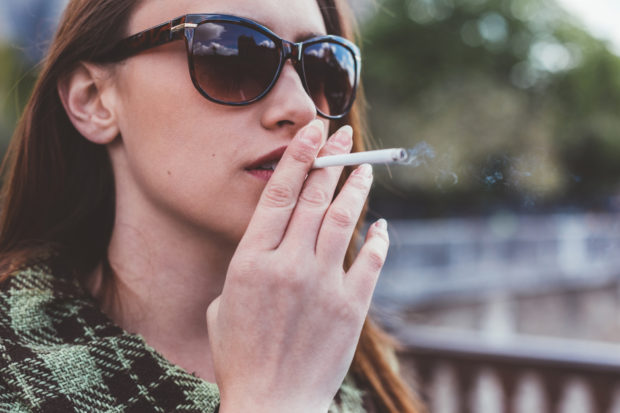New study reveals why smokers may be at greater risk of severe COVID-19

Image: IStock.com/martin-dm via AFP Relaxnews
New research has found that smokers and those with chronic obstructive pulmonary disease (COPD) may be more likely to develop severe cases of COVID-19, due to having higher levels of a molecule in their lungs which allows the virus to enter and cause infection.
Led by the University of British Columbia and St. Paul’s Hospital, Vancouver, Canada, the new study looked at samples taken from the lungs of 21 COPD patients and 21 participants who did not have COPD.
The researchers tested the samples to measure the levels of a molecule called angiotensin converting enzyme II (ACE-2), which is found on the surface of the lungs and acts as the “entry point” for coronavirus to get into the lung cells.
Other factors about the patients, such as whether they were current smokers, former smokers or had never smoked, were also recorded.
The findings, published today in the European Respiratory Journal, showed that the COPD patients had higher levels of ACE-2 in their lungs than patients without the condition. Moreover, higher levels were also found in the participants who smoked.
The team then compared their data against two existing study groups which had together included a total of 249 people and a mix of non-smokers, former smokers and current smokers.
The results once again showed that current smokers had higher levels of ACE-2 in their lungs, while non-smokers and even former smokers had lower levels.
Lead author Dr. Janice Leung commented on the findings saying, “The data emerging from China suggested that patients with COPD were at higher risk of having worse outcomes from COVID-19. We hypothesized that this could be because the levels of ACE-2 in their airways might be increased compared to people without COPD, which could possibly make it easier for the virus to infect the airway.”
“We found that patients with COPD and people who are still smoking have higher levels of ACE-2 in their airways, which might put them at an increased risk of developing severe COVID-19 infections. Patients with COPD should be counseled to strictly abide by social distancing and proper hand hygiene to prevent infection,” said Dr. Leung.
“We also found that former smokers had similar levels of ACE-2 to people who had never smoked. This suggests that there has never been a better time to quit smoking to protect yourself from COVID-19.”
Professor Tobias Welte, an infections expert from the European Respiratory Society who was not involved in the study also commented saying, “This study gives some interesting insight into why some people may be at risk of more severe COVID-19 symptoms than others. What it does not tell us is whether it’s possible to manipulate ACE-2 levels to improve survival in patients infected with COVID-19 or whether this would make a difference in COPD patients who contract the infection.” RGA
RELATED STORIES:
WHO: Step up efforts against smoking
Smoking linked to increased rates of depression among young adults
For more news about the novel coronavirus click here.
What you need to know about Coronavirus.
For more information on COVID-19, call the DOH Hotline: (02) 86517800 local 1149/1150.
The Inquirer Foundation supports our healthcare frontliners and is still accepting cash donations to be deposited at Banco de Oro (BDO) current account #007960018860 or donate through PayMaya using this link.